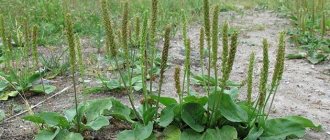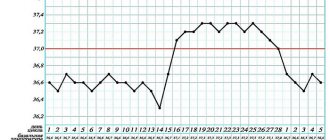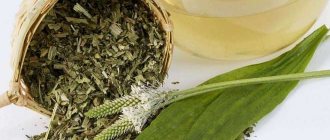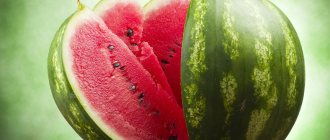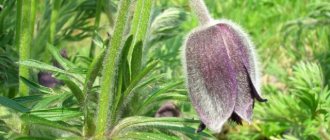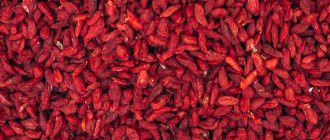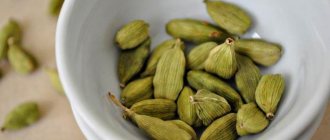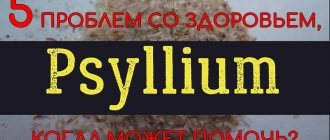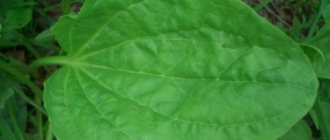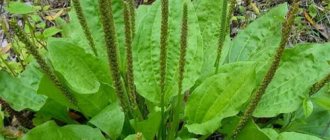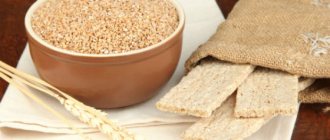Psyllium husk is one of the best fibers known for its ability to relieve constipation. But what other benefits can it bring to our health and is it really harmless? Later in the article, you can find out what other interesting benefits scientists have discovered from psyllium husk and what side effects should be considered when taking it.
The article is based on the findings of 52 scientific studies
The article quotes authors such as:
- Department of Nutritional Sciences, University of Wisconsin-Madison, USA
- Department of Natural Products Research, Department of Biological and Biomedical Sciences, Aga Khan University College of Medicine, Karachi, Pakistan
- Department of Biometrics, Medical University of South Carolina, Charleston, USA
- Department of Medicine, University of Bristol, Bristol Royal Infirmary, UK
- Department of Gastroenterology and Surgery, Queen's Medical Centre, Nottingham, UK
- and other authors.
Please note that the numbers in parentheses (1, 2, 3, etc.) are clickable links to peer-reviewed scientific studies. You can follow these links and read the original source of information for the article.
What is psyllium husk?
Plantain (Plantágo) is a genus of perennial herbs, numbering 153 species, distributed throughout the world, but most often found in India. Today, plantain seeds (psyllium or ispaghula) are used commercially to produce mucilage. India is the largest producer of psyllium husk. Plantain seeds themselves have been used in traditional Iranian medicine for hundreds of years.
RIPENING OF PLANTAIN SEEDS
The inner part of psyllium seeds contains many starches and fatty acids, making an excellent natural supplement for animal nutrition. The outer shell (husk) is ground into fine particles that are clear, colorless, gelatinous dietary fibers that provide health benefits to both humans and animals when eaten. []
Not only do the husks provide health benefits, but because they turn into a gel-like state when mixed with water, the husks are a popular additive in cooking to thicken the texture of food. []
Plantain and its beneficial properties
Plantain contains a large amount of useful substances, but they are all contained in different parts of it. Therefore, a certain part of the plant is used to treat any disease.
So, plantain root is rich in:
- linoleic acid, which is necessary for the functioning of the body;
- phytosterol is a substance that helps restore hormonal balance.
The leaves of the plant contain the following beneficial substances:
- phytoncides, as well as tannins that have a bactericidal effect;
- various organic acids (fumaric, chlorogenic, ferulic and others), as well as vitamins that help improve metabolic processes;
- The presence of polysaccharides gives plantain wound-healing and anti-inflammatory properties.
Beneficial substances contained in the stems:
- the presence of phenol carbonic acids that help strengthen the immune system;
- flavonoids – redox processes.
Plantain seeds contain a large amount of vegetable proteins and mineral salts.
Important: If you harvest plantain yourself, you should collect it away from the roadway. The plant is capable of absorbing harmful substances from car exhaust gases.
All of the above substances and their interaction give plantain anti-inflammatory, wound-healing, bactericidal, immune-stimulating and anti-allergic properties.
Composition of psyllium seed husk
Psyllium husk mainly consists of carbohydrates (85%) and the rest consists of fats, vegetable ash and protein. []
The carbohydrate portion contains twice as much insoluble fiber (cellulose, hemicellulose, lignin) as soluble fiber, both of which are important to the benefits a person receives from consuming this husk.
- Soluble fiber : a gel-like material that easily absorbs water and then expands its volume
- Insoluble fiber : Made up of indigestible, water-resistant plant matter. []
Mechanism of action of psyllium husk
The dry, fibrous composition of psyllium husk binds water in the intestines by drawing water from the environment.
- The soluble part of the husk easily absorbs water, expanding greatly in the intestines. This property has a double effect - it softens stool and physically stimulates the movement of stool through the intestines.
- Insoluble fibers do not absorb water, but still help draw water out of the intestines and physically stimulate intestinal motility. They also increase the size of the stool and make it more cohesive and harder.
This mechanism is the best known benefit of psyllium husk. In addition, the husk also binds to muscarinic and serotonin 5-HT receptors, which further contributes to the laxative effect described above.
DIAGRAM OF THE POSSIBLE MECHANISM THROUGH WHICH DIETARY FIBER AFFECTS THE FUNCTIONS OF THE GASTROINTESTINAL TRACT (source)
Psyllium husk may also block CA(2+) calcium channels and activate non-cyclic guanosine monophosphate pathways, which reduces intestinal stimulation. This may explain the paradoxical ability of psyllium husk to treat constipation and diarrhea.[]
Psyllium (psyllium husk): description, properties, indications for use
Psyllium is the husk of the seed of the plantain (Indian or Transcaucasian), which is an effective folk remedy in the treatment of many diseases.
The second name for Psyllium, which can be found in literature, is Isfagul or Ispagol. Indian plantain is not a simple medicinal leaf, which is familiar to many from childhood as the No. 1 remedy for treating broken knees. Psyllium is a valuable medicinal plant that is grown in India, as well as in some areas of Transcaucasia. This plant has almost no taste of its own because it consists of 80% fiber, which is responsible for most of its beneficial properties.
Psyllium husk has been used in folk medicine and cooking for a very long time. Psyllium is available in the form of whole or crushed husks, capsules or powder.
Psyllium husk treats constipation
Adding psyllium husk to your diet has been shown in research and practice to reduce the likelihood of developing constipation by drawing in and absorbing water as it passes through the intestines. This softens and increases the size of the stool, while making it easier to move through the intestines. [, ]
In several small human studies (up to 15 patients per study), psyllium husk significantly reduced stool transit time and increased both bulk density and relative softness. [, , ]
And this was achieved without interfering with the absorption of nutrients as food passes through the intestines. []
Additionally, in a clinical study of 170 patients, psyllium was found to be a better and more effective stool softener and treatment of chronic constipation than docusate sodium .
a well-known laxative commonly used in medical settings). []
Psyllium seed husks may help treat hemorrhoids by making stool softer and more
moist. A study on rats found that psyllium is more effective than cellulose (an insoluble fiber found in most plants) in creating more moist stool, likely due to the contents in the husk. Psyllium seeds have soluble fiber that resists fermentation by bacteria in the intestines. []
Psyllium husk helps with diarrhea
Psyllium husk can also help treat diarrhea, which seems surprising and strange, because this husk treats constipation. []
In 2 studies involving 39 patients, psyllium husk increased the time of stool formation and improved the movement of stool in the intestines of patients with diarrhea. In the same studies, in patients with constipation, the transit time of stool through the intestines was reduced. [, ]
This information suggests that psyllium husk is more of a “regulating” fiber rather than a strictly anti-diarrhea or constipation agent.
NATURAL PRODUCTS, LIKE PLANNILL SEED HUSK, CAPABLE OF HELPING WITH DIARRHEA (DIARRHEA)
A randomized controlled pilot study evaluated psyllium husk in 60 cancer patients with radiation-induced diarrhea, showing a reduction in both the frequency of diarrhea and the severity of its symptoms. []
Sometimes diarrhea is an unavoidable side effect of taking the medicine. Patients with liver failure may exhibit symptoms of brain damage when increased amounts of ammonia in their blood cause changes in mental abilities. This side effect is treated with lactulose, which in turn can cause significant diarrhea. []
A randomized crossover study of 8 patients found that psyllium husk delayed gastric emptying and decreased bowel transit rate, possibly due to poor fermentation of psyllium husk compared to other fibers. []
Psyllium husk helps in lowering blood sugar
Several types of fiber have the ability to control blood sugar: guar, pectin, gum tragacanth, methylcellulose, wheat bran, cholestyramine. At the same time, the effect of reducing glucose was manifested at a dose of at least 12 grams of these types of fiber per day. []
In multiple double- and single-blind clinical studies (up to 125 patients), psyllium husk significantly reduced both fasting and postprandial blood sugar levels, reduced insulin spikes and decreased glucose absorption with a decrease in glycated hemoglobin HbA1c . [, , , , , ]
Similar results were obtained in a meta-analysis of 7 studies involving 378 patients, including 3 randomized and blinded studies. []
FIBER FROM VARIOUS FOODS HELP REDUCE GLUCOSE LEVELS
In a small, double-blind clinical trial of 49 patients, psyllium husk not only improved fasting blood sugar and HbA1c levels, but also reduced the need for metformin (a well-known diabetes ). []
It is important to note that these results were achieved when psyllium husk was consumed with meals .
Plantain seeds - their medicinal properties, contraindications
The seeds of the plant are no less useful than plantain leaves. They contain mucus, fatty and organic acids, polysaccharides, bitterness, vitamins A, C, PP, minerals - potassium, calcium, manganese, selenium. Thanks to this, they have the following medicinal properties:
- Antibacterial, antimicrobial, anti-inflammatory.
- Diuretic.
- Expectorants.
- Restoring, wound healing.
The main advantage is that the biologically active substances of their composition effectively treat the reproductive organs of men and women.
Small seeds contain a lot of mucus.
In addition, the small seeds of the plant are rich in mucus, so they help protect the gastrointestinal tract from various irritations, enveloping the mucous membrane, having a mild laxative effect. They also effectively help remove toxins, bad cholesterol, prevent the risk of heart disease, atherosclerosis and maintain normal blood sugar levels.
Plantain seeds - what they treat
In folk medicine they are used in the treatment of:
- Diseases of the digestive tract (constipation, colitis, enterocolitis, gastritis with low acidity, peptic ulcer, hemorrhoids).
- Diseases of the genitourinary system, female and male infertility. Plantain seeds help improve sperm quality in men, eliminate adhesions and inflammation in the tubes in women who suffer from infertility.
- Endocrinological diseases (diabetes mellitus).
- Asthma, bronchitis, cough (as an expectorant).
- Diseases of the cardiovascular system, to improve immunity.
Contraindications
Plantain fruits do not contain toxic substances, but are not suitable for everyone. Their use for medicinal purposes is contraindicated:
- With increased acidity of gastric juice (this is the main contraindication).
- With increased blood clotting, tendency to thrombosis, hypertension.
- Children under 16 years of age, pregnant women, nursing mothers.
- In case of individual intolerance.
Before starting to use plantain seeds, it is better to consult with your doctor to eliminate any risks.
Psyllium seed husk promotes weight loss
Psyllium husk can be a useful product to aid in the weight loss by reducing appetite. []
In a double-blind, randomized clinical trial of approximately 200 overweight or obese patients, taking psyllium husk with food resulted in increased satiety, decreased appetite, and rapid weight loss (approximately 5 kg in 4 months and without other weight loss methods). ). []
The mechanism behind this may be explained by a small clinical study of 12 patients who found that psyllium husk delayed their gastric emptying, which likely contributed to increased satiety and decreased appetite. []
Another clinical study of 17 women found the same changes in satiety and decreased appetite, and also found that subjects inherently reduced their daily fat intake .[]
LOSSING WEIGHT IS A SERIOUS PROCESS OF CHANGING YOUR WHOLE LIFESTYLE (NUTRITION, PHYSICAL ACTIVITY, DAY ROUTINE, RESTORATION OF MICROFLORA , ETC.)
Psyllium husk is associated not only with weight loss, but in another double-blind clinical study involving 72 patients it was shown that the husk reduced body mass index (BMI) and body fat percentage . The study noted that although this was achieved using psyllium husk alone, combining this product with a healthy diet produced even more excellent results. []
Psyllium Husk Lowers Cholesterol Levels
Eating psyllium husk may improve your total cholesterol levels. []
Two clinical studies (including a double-blind study on 25 patients) found a decrease in total cholesterol and LDL-cholesterol with a simultaneous increase in HDL-cholesterol with husk supplementation.[, ]
Similar changes in cholesterol levels were found in a meta-analysis of 21 clinical trials involving a total of 1,030 patients, although it was noted that the decrease in total cholesterol was faster than the decrease in LDL cholesterol. The findings indicated that such effects may depend on the dose and timing of psyllium husk intake. []
PLANTS THAT REDUCE CHOLESTEROL LEVELS
The effect of psyllium husk on cholesterol may be partially explained by a small clinical study of 20 patients who found a decrease in LDL levels and an increase in bile acid production after receiving a dose of psyllium husk. []
The production of bile acids and their subsequent elimination is the main method for releasing cholesterol from the blood. []
A small, clinically blinded, randomized trial examined the effects of psyllium husk in 45 young men who were at increased risk of developing metabolic syndrome. After taking psyllium husk, there was not only an improvement in the cholesterol profile, but also an improvement in the overall composition/distribution of body fat . []
What problems can plantain help with and how to use it?
Both as an independent treatment and along with traditional medicinal therapy, plantain can be used in the form of decoctions and infusions to treat the following problems:
- adhesions in the fallopian tubes and their obstruction
- inflammatory diseases of the vagina (colpitis) and uterine appendages
- excessively heavy menstruation
- lack of ovulation
- infertility
- climacteric disorders
- cystitis
- impotence and decreased sperm motility in men
To do this, in folk medicine it is recommended to use the plant as follows:
Psyllium Husk May Lower Blood Pressure
Psyllium husk can help you treat high blood pressure (hypertension). One small clinical trial of 36 patients found that a fibrous diet provided a reduction in systolic blood pressure of approximately 5.9 mm/Hg. These results were independent of age, gender, body weight, alcohol consumption, or urinary sodium/potassium levels.[]
A study in rats prone to increased blood pressure when exposed to salt found a smaller increase in blood pressure when psyllium husk was added to the diet and suggested that this effect was due to psyllium causing increased excretion of sodium in feces. []
Although this study was conducted on rats, these important findings may be useful for patients at risk of cardiac arrest and food sensitivities. This increase in blood pressure is strongly associated with holiday overeating, emotional stress, and decreased physical activity. However, it is worth considering that psyllium husk may have some time-limited effects. []
THE DASH DIET WAS SPECIFICALLY CREATED TO LOWER BLOOD PRESSURE AND REDUCE THE RISK OF CARDIOVASCULAR DISEASE
Another clinical study in 72 healthy people compared the effects of a special high-fiber diet and a healthy diet versus a placebo when followed for 12 weeks. The study found that psyllium husk by itself initially reduced systolic and diastolic blood pressure , but the effect did not last for a full 12 weeks, whereas a healthy diet (by itself and without psyllium husk) had a longer lasting effect and created greater improvements in blood levels. pressure. []
Given these findings, psyllium husk may play a supportive role in the treatment of high blood pressure, but more extensive research is needed.
Psyllium Husk - Health Benefits
Let's look at five proven beneficial properties of psyllium.
Relieves constipation and diarrhea
Constipation is a very common health problem. Chronic constipation is especially common in adults over 60, with symptoms affecting up to 50% of nursing home residents. Scientific research recommends supplemental fiber intake in the form of psyllium to improve symptoms and naturally relieve constipation (2). Psyllium is recommended to be used instead of magnesium-based laxatives, which should be avoided due to potential toxicity.
When combined with water or other liquid, psyllium husks swell and produce more volume, which stimulates intestinal contractions and helps speed up the passage of stool through the digestive tract. Psyllium has also been found to be superior to docusate sodium for softening stool by increasing stool water content and having greater overall laxative effectiveness (3).
Since psyllium husk helps ease elimination, it also helps naturally treat hemorrhoids, which are often the result of constipation. Psyllium can also be used to relieve mild to moderate diarrhea. Psyllium husk will benefit people suffering from diarrhea because it absorbs a significant amount of water in the digestive tract, which helps make stool firmer and pass through the system more slowly.
How to drink psyllium for constipation – 1 tbsp. Dissolve a spoonful in a glass of clean water at room temperature and drink 30 minutes before bedtime. Course – 1 week.
Reduces cholesterol levels
Research shows that psyllium husk is a therapeutic addition to a healthy diet and lifestyle for people struggling with high cholesterol.
In one experiment, all subjects maintained their usual diet, which provided less than 300 milligrams of cholesterol per day and approximately 20% energy from protein, 40% from carbohydrates, and 40% from fat (4). The study found that eight weeks of psyllium treatment reduced serum total cholesterol levels by 14.8%. Low-density lipoprotein (LDL) cholesterol levels decreased by 20.2% and the LDL-to-high-density lipoprotein cholesterol ratio decreased by 14.8% compared to baseline values. The reductions in total and LDL cholesterol gradually increased over time, and this trend appeared to continue into the eighth week.
Another study published in the Journal of the American Medical Association examined the benefits of psyllium husk as an adjuvant therapy for people with low to moderately high cholesterol. The study found that, compared to placebo, psyllium achieved a 4.8% reduction in total cholesterol and an 8.2% reduction in low-density lipoprotein cholesterol, clearly demonstrating psyllium husk's ability to lower cholesterol naturally (5).
How to drink psyllium to normalize cholesterol - dissolve 1 teaspoon in a glass of warm clean water and drink 1 hour before bedtime. Course – 4 weeks.
Helps manage blood sugar levels
Psyllium may help current diabetics as well as people trying to prevent diabetes, as consuming fibers such as psyllium husk can help maintain a healthy glycemic balance in the body.
One study evaluated the effects of psyllium husk fiber on lipid and glucose levels as an adjunct to dietary and drug therapy in patients with type II diabetes. A study found that taking psyllium every day may help patients with type II diabetes control their blood sugar levels without negative side effects (6).
Another study found similar results indicating a beneficial therapeutic effect of psyllium in the metabolic control of type II diabetics. Psyllium husk certainly looks like a wise choice for the everyday task of controlling blood sugar levels and is also a natural remedy for diabetes.
How to drink psyllium to prevent diabetes - dissolve 1 teaspoon in a glass of warm clean water, stir and drink 1 hour before breakfast. Course – 2 weeks.
Improves heart health and blood pressure
Adding high-fiber foods such as psyllium husk to your diet has benefits in reducing the risk of heart disease. More specifically, a diet high in soluble fiber, such as psyllium, is associated with lower triglyceride levels and a lower risk of cardiovascular disease. A study in the European Journal of Clinical Nutrition assessed the effects of psyllium on patients with type II diabetes and found that psyllium not only improved blood sugar levels, but also reduced the risk of coronary heart disease (7).
Psyllium has also been shown to improve hypertension, or high blood pressure, which has a direct negative impact on heart health. Hypertension affects 30% of the population and is a preventable disease.
One of the main ways to prevent hypertension is to eat a healthy diet. In one experiment, six months of psyllium fiber supplementation significantly reduced both systolic and diastolic blood pressure in overweight hypertensive people (8).
How to drink psyllium to prevent heart disease - dissolve 1 teaspoon in a glass of water and drink 30 minutes before bedtime. Course – 1 month.
Helps with weight loss
In our society, obesity is the most common health problem affecting all age groups. It leads to many serious health problems, including diabetes and chronic heart disease. Are there any benefits of psyllium (psyllium) seed husk for weight loss? Psyllium husk is on the list of medicinal plants that have been shown to significantly reduce body weight (9).
Psyllium can be very helpful in maintaining and achieving a healthy weight as it creates a feeling of fullness when consumed. Since we naturally eat less when we feel full, adding extra fiber to our diet in the form of psyllium husk can help prevent overeating and naturally treat obesity.
Additionally, psyllium husk's ability to enhance the body's natural elimination process has a positive effect on weight as waste is eliminated faster and regularly from the body. A study published in Clinical and Experimental Hypertension in August 2007 found that supplementing with psyllium over a six-month period resulted in a decrease in body mass index (10).
If you are trying to lose weight quickly and want to control overeating during meals, you can take psyllium husk shortly before or during meals. Research suggests that supplementing with functional fibers such as psyllium should be considered as a tool for improving success in weight loss diets.
How to drink psyllium for weight loss - dissolve 1 teaspoon in a glass of water and drink 30 minutes before dinner. Course – 1 month.
Psyllium husk is a good prebiotic
Prebiotics are non-digestible plant fibers that feed gut bacteria and help them grow. Plantain is believed to have prebiotic effects . [, ]
Although plantain is somewhat difficult to ferment, a small portion of its fiber can still be fermented by intestinal bacteria. This fermentation can help produce short-chain fatty acids (SCFAs), which are associated with health benefits. [, , , ]
One study found that taking 10 grams of psyllium husk twice daily for 12 months increased butyrate . []
Psyllium husk also has an advantage over regular probiotic fibers - it is fermented by bacteria more slowly than other fibers, which does not increase gas formation in the intestines or cause discomfort.
PLANTS WITH GOOD PROBIOTIC EFFECT
It turned out that taking psyllium husk for 4 months helped reduce negative digestive symptoms in patients with ulcerative colitis . []
Additionally, the combination of psyllium husk and probiotics appears to be particularly effective in treating ulcerative colitis and Crohn's disease . [, ]
Contraindications
We figured out what medicinal properties of plantain seeds can be useful to you - agree, the list is impressive? Now let's talk about the possible harm that the plant can cause if consumed excessively.
Let us remind you that moderation in use should always be observed - no matter what kind of medicine we are talking about. If you doubt the advisability of consumption, consult your doctor, who will select the appropriate dosage.
So, let's talk about what conditions and diseases are direct contraindications to use:
- Individual intolerance and tendency to allergic reactions;
- Increased acidity – the seed increases the production of gastric juice;
- Tendency to thrombosis and accelerated blood clotting;
- Pregnancy and lactation period.
We also recommend: What vitamins are in pomegranate?
That's all, we have studied in detail the benefits and harms of plantain seeds. It's time to move on to another, no less important parameter - the chemical composition.
Psyllium Husk May Help Treat Ulcerative Colitis and Irritable Bowel Syndrome
We know that psyllium husk plays a role in treating both diarrhea and constipation, as discussed earlier. Such symptoms are also present in irritable bowel syndrome and ulcerative colitis . []
One clinical study involving 28 patients examined the effect of psyllium husk in patients with irritable bowel syndrome . The husk has been shown to reduce symptoms and prevent relapse of the disease.
A placebo-controlled study involving 29 patients with ulcerative colitis in remission showed a good effect of psyllium husk on intestinal symptoms compared with placebo. Four patients were unable to complete this study due to relapse, noting that three of them were in the placebo group. []
Psyllium Husk Reduces Risk of Colon Cancer
In a study of rats exposed to a known colon carcinogen (a cancer-causing chemical), psyllium husk significantly reduced the incidence of tumors compared to fiber and a normal control (placebo). []
A DIET WITH AT LEAST 50 G FIBER PER DAY CAN PRODUCE 24 G OF
BUTYRATE IN THE COLON AND REDUCE THE RISK OF COLON CANCER
Side effects of taking psyllium husk
Overall, taking psyllium husk is associated with very few side effects. The most common is some mild and temporary discomfort in the intestines. [, , , ]
However, there are a few cases you should be aware of:
- Two clinical studies involving a total of 11 nurses diagnosed with occupational asthma associated with psyllium exposure showed:
- One of them studied 5 nurses who had asthma symptoms after preparing a drink for their patients from psyllium husks. All of them were found to have IgE antibodies to plantain , and symptoms of difficulty breathing. One nurse experienced reactive airway closure and required 3 hours of assisted ventilation. []
- Another study examined the response of nurses with asthmatic symptoms to the oral administration of psyllium husk. All 6 participants in this study developed respiratory symptoms requiring urgent medical attention. []
- One study of a 40-year-old woman who took a laxative containing psyllium seed for 2 years found that the woman developed itching all over her body except her face. The symptoms stopped when psyllium was removed from the list of medications taken. This woman was found to have IgE antibodies to plantain. It is important to note that her sensitivity was related to the psyllium protein and was likely due to internal exposure to the seeds rather than their husks .[]
- In one case, a patient taking oral lithium (a drug to treat bipolar disorder) experienced a decrease in lithium blood levels when taking psyllium husk , which returned to normal after stopping the psyllium. []
- Four patients developed small bowel obstruction after using psyllium as an oral contrast agent for CT or MRI. The conclusion was that caution should be used when using psyllium husk in people with suspected intestinal strictures or active intestinal inflammation. []
- Doses of 5-10 grams of psyllium husk taken 3 times daily did not result in serious side effects. However, cramping, gas, or bloating may occur when using psyllium seeds. [, , ]
- Plantain has also been able to delay the absorption of some medications. Therefore, it is not recommended to take psyllium husk with all other medications.
- Although rare, some allergic reactions such as rash, itching, or difficulty breathing may occur as a result of taking psyllium. [, ]
Dosage of psyllium husk
The Lexicomp drug database recommends the following doses:
- For constipation : 2.5-30 g/day divided into several doses (for children aged 6 to 11 years: 1.25-15 g/day in several doses).
- To reduce the manifestation of coronary heart disease : at least 10.2 g/day
- For additional therapy for type 2 diabetes : 6.8-13.6 g/day in 2 doses
- For irritable bowel syndrome : 10 g/day for 1 or 2 doses. []
- Psyllium seed husk can be safely consumed in doses of 5-10 g/day with meals, at least 2-3 times a day. However, when it comes to dietary fiber intake, more is not always better. The benefits of psyllium seed found in most studies were in the range of 3-20.4 g/day, and larger intakes may create digestive problems. []
The information on this site has not been evaluated by any medical organization. We do not seek to diagnose or treat any disease. The information on the site is provided for educational purposes only. You should consult your physician before acting on information from this site, especially if you are pregnant, nursing, taking medications, or have any medical condition.
Rate this article
Average 4.6 Total votes (36)
Application recipes
Plantain seeds have long been used in folk medicine; their medicinal properties have been known for more than two thousand years.
They contain many vitamins, bitter and tannin substances, fiber, which normalize the functioning of the stomach and intestines. The mucus included in the composition envelops the mucous membranes of the stomach and intestines, relieves irritation, promotes their healing and regeneration.
For diarrhea, dysentery:
- A decoction is recommended: pour 10-20g of seeds with a glass of water, boil for 10 minutes, strain after cooling. Take a tablespoon of infusion throughout the day, half an hour before meals.
- Take a teaspoon of plantain fruit powder half an hour before meals.
Plantain seeds are also used for atonic and spastic constipation, as a mild laxative:
Table. l. whole or crushed seeds (20-30 g) are taken in the morning on an empty stomach or at night with water or sweet tea. The effect will occur 8-10 hours after administration.
When treating colitis:
Prepare an infusion: teaspoon. Pour boiling water over the fruit and leave for half an hour. Take 2 tbsp. l. every time before meals. Envelops the inflamed gastric mucosa and relieves pain. Used as a laxative.
For conjunctivitis, blepharitis:
Pour 10 g (2 tsp) of fruit into a glass, porcelain or enamel bowl, pour 2 tsp. l. cold boiled water, shake, add half a glass of boiling water, shake again. After cooling, strain, make lotions, rinse for inflammation of the mucous membrane of the eyes - relieves inflammation.
For inflammatory eye diseases, a decoction is also used.
For gastritis, colitis:
Table. Brew a spoonful of small fruits without a top with a glass of boiling water, leave until evening. Drink the infusion in one dose before bed.
Watch a video about the anti-inflammatory properties of seeds:
Contraindications
- Acute inflammation, obstruction of the gastrointestinal tract
- Individual intolerance
For infertility
In Chinese medicine, plantain seeds have long been used for diabetes and cough; their use is effective for male and female infertility.
Prepare the infusion: Table. Brew a spoonful of raw materials with a glass of boiling water, leave for an hour. Drink in the middle of the menstrual cycle. Taken by men and women for three to six months, the product is harmless to the body and available.
The use of the infusion is useful in the treatment of menopausal disorders, female gynecological inflammatory diseases, and helps stabilize a woman’s hormonal levels.
For consultation, examination and identification of the main causes of infertility, you must consult a specialist; do not self-medicate.
Watch the video with the herbalist:
Application in cosmetology
In cosmetology, poultices made from plantain seeds are used to smooth out wrinkles, skin ulcers, eye inflammation, and are also used in the form of compresses, lotions and ointments.
